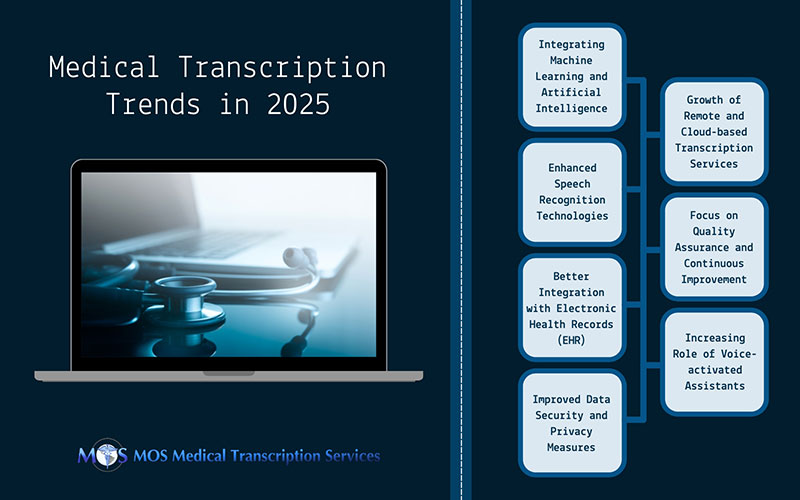Table of Contents
As the healthcare industry continues to evolve, medical transcription services have become indispensable for hospitals, clinics, and private practices. These services help healthcare professionals efficiently document patient interactions, treatment plans, and medical histories, ultimately enhancing the quality of care provided. Medical transcription serves as a bridge between healthcare providers and patient records, ensuring that critical information is well-documented and easily accessible. By transcribing physician dictations into structured reports, medical transcriptionists help streamline workflow and minimize documentation errors. Outsourcing medical transcription has become a viable solution for healthcare facilities aiming to improve efficiency, reduce administrative burdens, and maintain high accuracy in medical documentation.
The Significance of Medical Transcription in Healthcare
- Enhancing Patient Care and Outcomes: Accurate medical transcription contributes to improved patient care by providing comprehensive and structured documentation. Physicians rely on transcribed records to make informed clinical decisions, track a patient’s medical history, and formulate appropriate treatment plans. High-quality transcription minimizes errors in the medical records, reducing the risk of misdiagnoses, incorrect treatments, and medical complications.
- Supporting Healthcare Professionals: Medical professionals have demanding schedules, making it difficult to allocate time for manual documentation. Medical transcriptionists ease this burden by accurately converting dictated notes, handwritten reports, and other forms of clinical documentation into structured digital records. This efficiency allows healthcare providers to dedicate more time to patient interaction and medical decision-making, ultimately improving the quality of care.
- Compliance and Legal Protection: Healthcare facilities must adhere to strict compliance guidelines, including HIPAA regulations and other privacy laws. Proper medical documentation is crucial for legal protection, insurance claims, and audits. Well-maintained transcripts ensure that healthcare providers meet regulatory requirements, reducing legal risks and financial penalties associated with documentation errors.
Medical transcription, however, must be error-free. Even minor errors can have dire consequences.
The Consequences of Inaccurate Medical Transcription
Errors in medical transcription can have severe consequences for both patients and healthcare providers. Some potential risks include:
- Misdiagnosis and Incorrect Treatment: Inaccurate records can lead to improper diagnoses and incorrect treatment plans, putting patient safety at risk.
- Delayed Patient Care: Errors in transcription can cause miscommunication among medical professionals, leading to delays in treatment and compromised healthcare outcomes.
- Legal and Financial Liabilities: Poor documentation can result in legal disputes, malpractice claims, and insurance reimbursement issues, affecting the financial stability and reputation of healthcare institutions.
- Compromised Medical Research and Data Integrity: Medical records contribute to research and statistical analysis. Inaccurate transcription can distort data, impacting medical research and public health policies.
The Role of Medical Transcriptionists in Ensuring Precision
Medical transcriptionists are trained professionals who play a crucial role in ensuring the accuracy and quality of clinical documentation. Their expertise in medical terminology, grammar, and transcription standards helps prevent errors that could negatively impact patient care. Key contributions of medical transcriptionists include:
- Accuracy and Thoroughness: They carefully listen to recordings and transcribe them with precision, ensuring that medical terms, diagnoses, and prescriptions are correctly documented.
- Standardization and Consistency: Transcriptionists use standardized formats, ensuring consistency in medical records across different healthcare providers.
- Error Detection and Verification: They cross-check medical reports, identify inconsistencies, and verify information to ensure accuracy.
- Maintaining Confidentiality: Professional transcriptionists follow strict confidentiality protocols to protect patient information and ensure compliance with data privacy regulations.
Trends to Expect in 2025
- Integrating Machine Learning and Artificial Intelligence: Medical transcription is about to undergo a revolution due to artificial intelligence (AI) and machine learning (ML). The precision and effectiveness of transcription services are being improved by these technologies. Complex medical context and language can be understood by sophisticated algorithms, along with human interaction. It is anticipated that by 2025, AI-driven transcription systems will have advanced to a point where they can better handle a variety of accents and dialects, as well as contextual subtleties in medical speech.
- Enhanced Speech Recognition Technologies: Speech recognition has already transformed medical transcription, but 2025 will bring even more sophisticated advancements. Next-generation speech recognition systems will leverage deep learning and natural language processing to achieve almost perfect accuracy. These innovations will enhance the ability to interpret complex medical terminology, diverse accents, and contextual nuances, ensuring more precise and efficient documentation.
- Better Integration with Electronic Health Records (EHR): The seamless integration of medical transcription with Electronic Health Records (EHR) is becoming a necessity. Future transcription solutions will be designed to synchronize effortlessly with EHR systems, allowing real-time updates and immediate access to patient records. This integration will optimize workflow efficiency, minimize redundancy, and improve overall patient care by maintaining up-to-date and easily retrievable medical documentation.
- Improved Data Security and Privacy Measures: With the digitization of medical transcription, data security and privacy concerns will continue to grow. By 2025, stringent regulations and advanced security frameworks will be implemented to protect sensitive patient information. Transcription providers will need to adopt cutting-edge encryption protocols and comply with evolving privacy laws to prevent data breaches and unauthorized access.
- Growth of Remote and Cloud-based Transcription Services: The shift toward remote work and cloud-based solutions is revolutionizing medical transcription. By 2025, remote transcription services will become the standard, enabling professionals to work from any location while maintaining accuracy and confidentiality. Cloud-based platforms will facilitate seamless collaboration and data sharing, making transcription services more flexible and scalable.
- Focus on Quality Assurance and Continuous Improvement: As medical transcription technology evolves, quality assurance will be a top priority. Advanced transcription systems will incorporate automated error detection and correction mechanisms to enhance accuracy. These innovations will ensure transcriptions meet industry standards and reduce the likelihood of documentation errors, ultimately improving patient care.
- Increasing Role of Voice-activated Assistants: Voice-activated and virtual health assistants will play an increasingly significant role in medical transcription by 2025. These intelligent tools will assist healthcare professionals by automating documentation, enabling hands-free transcription, and providing real-time updates. Their integration will streamline administrative processes, allowing medical practitioners to focus more on patient care and less on manual documentation tasks.
As 2025 begins, healthcare providers must stay ahead of these trends to optimize their documentation processes and improve patient care quality. By embracing these innovations, medical transcription will continue to be a vital component of the healthcare industry, ensuring efficiency, accuracy, and security in medical record-keeping.
While these trends promise to significantly speed up transcription processes, no matter how advanced technologies can speed up transcription, it will still need human intervention to ensure accuracy. This critical human touch is essential to produce error-free medical records that not only improve patient care but also enhance the overall efficiency of the healthcare industry. Considering both cutting-edge technology and the irreplaceable role of skilled professionals, medical transcription services are a vital component of modern healthcare, driving progress and safeguarding patient wellbeing.




